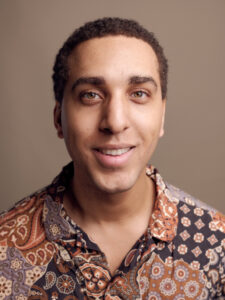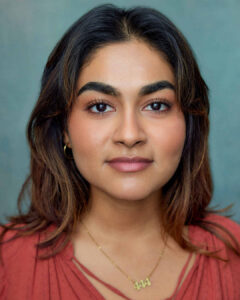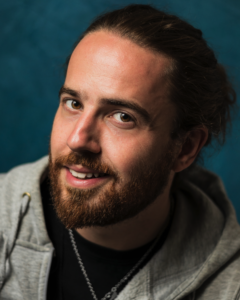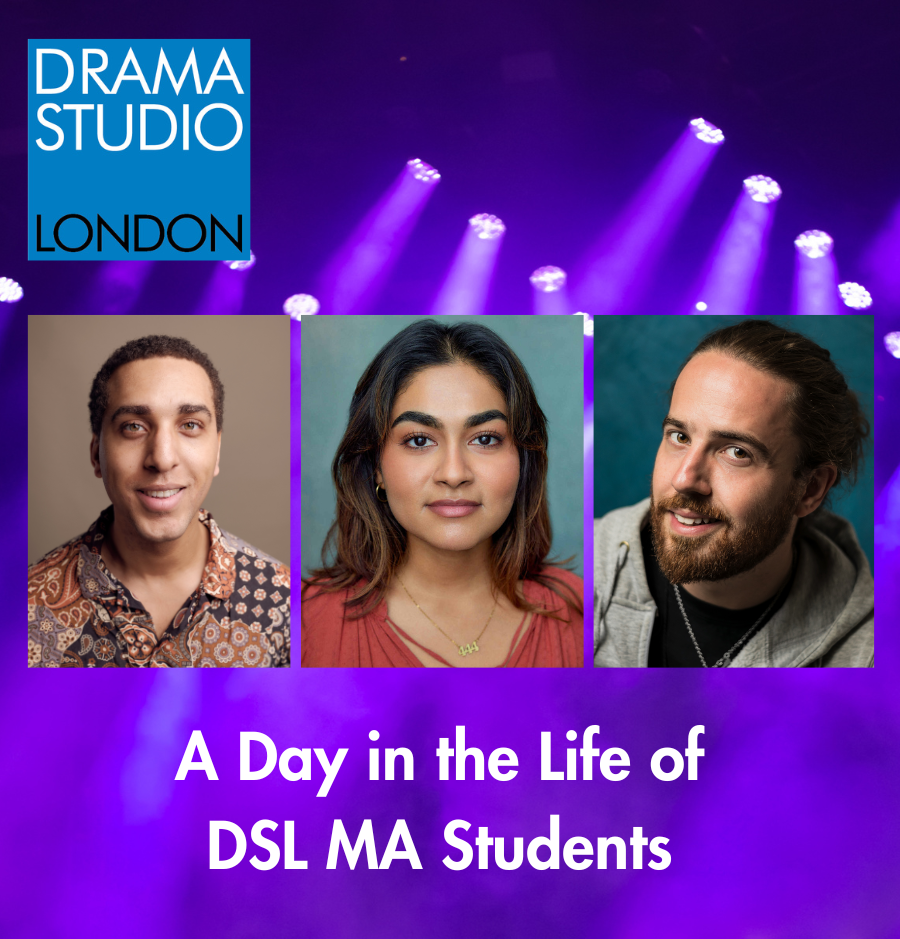Meet three of our 2024 cohort: Milo Costello, Analise Dias and Ant Henson.
In this interview they talk about life at Drama Studio London, what they’ve learned, their aspirations and their advice to the next wave of applicants.
Thanks for giving up your time to share your experiences. Please can you start by sharing what you were doing before your studies with Drama Studio London?

Milo:
I’m from North-West London. Prior to this course I attended Nottingham Trent University and studied a BSc in Chemistry. Post university I worked for British Airways as a flight attendant for a further 5 years, travelling around the world in a flying metal tube. I had heard about DSL through a colleague that attended the BA course, I then went to do a little research myself on the School and what each specific course offered, ultimately realising that the MA course would suit my educational and career requirements.

Analise:
I’m from North-West London too. Before DSL I graduated from the University of Leeds, reading English Literature and Theatre Studies. I was doing a variety of music and theatre work as well as working in hospitality and then for a property management company. Just when I planned to quit my job and try and seriously try to move into the industry, I saw a random advert for DSL and just had a gut feeling that I should explore the option. It was fate!

Ant:
I’m from sunny Dorset originally but have travelled around a lot! I originally studied Robotics (while getting very, very distracted by the university drama society) before living in London and France working as a musician/teacher/many other jobs. Acting was always the orbit that I could never escape, however, and in a moment of post-Lockdown clarity I realised that it was what I’d missed the most during the worst of the pandemic. Between things opening up again and applying for DSL, I’d been taking on as much acting as possible, a few amateur shows, a few small pro theatre and film jobs, and also toured as Edmund in a production of King Lear.
What was the DSL audition process like for you?
Milo:
The Audition process was probably a little different in comparison to others. I applied extremely late so could not attend the in-person auditions. I had a little over a week to prepare two speeches (one classical and one contemporary) as well as a movement piece inspired by 4 different music choices. In addition to that I was asked to talk a little bit about myself and interests in the performing arts as well as my previous experience. I received a recall audition within 3 days where I would perform my pieces again. it was a very fast and a very friendly process, I was definitely taken aback with the efficiency.
Ant:
Sending the tapes was definitely the scariest part! Saying words into the inscrutable aether is a terrifying prospect at the best of times, especially with something as imposing as “drama school” at stake. When I was lucky enough to be called into the room, it was much calmer. Everyone was lovely (from the school and the other auditionees – including Analise!) and, without the perfectionist pressure of being able to record multiple takes, I daresay it was actually a lot of fun…
What’s a typical day at DSL like for you?
Milo:
I arrive around 40 minutes before classes start (if the busses are kind to me) to do a full body and vocal warm up. This includes breath control, targeting specific muscle groups as well as some light strength conditioning such as Planking/Pushups. I will then go to my first class. In the break, I review my notes, relax, and then it’s back in to the second class. Lunch is spent with my year group in some way or another (the tutor groups tend to coalesce for lunch time) and we enjoy our food and each other’s company. After the final class of the day, I like to review what I’ve learnt either in one of the classrooms, or the library, or with my peers. I tend to get up on my feet to process the information by implementing it into my body and voice.
Analise:
I don’t think there’s such thing as a typical day at DSL! It depends entirely on what we’re working on at that moment. For example, we could have 3 sets of 2 hr classes on subjects such as movement, voice or particular acting techniques such as Meisner or Shakespeare workshops. Or if we’re working on a show, we have full day rehearsal periods. It also really depends on the directors and their particular styles of teaching.
Ant:
As Analise said, every day is so different. On teaching days, the classes rotate in carousel so our three groups usually all do the same things but at different times. It could be two hours of voice, followed by movement, followed by professional preparation. Another day could be Stanislavski, then Laban, then a workshop with an external facilitator. Rehearsal days vary wildly depending on the project but expect a full day of whatever kind of “process” that particular director likes to work with.
Tell us about your cohort and the ensemble work you have done?
Milo:
I’m blessed with 34 other people that I could call friends for life. We’ve done so much already! At the beginning of the year we started with contemporary theatre and text work. We performed small scenes and this quickly evolved in to our first ensemble piece where we put the specific methods and techniques from the first term into practice. From this we moved to Pantos! I performed as the Dame in Snow white. We toured to schools, performing to 7-11 year olds. We then took residency for a week in Malvern at The Coach House Theatre. That was all only term one! In term two we stepped in to the world of Shakespeare. The process was extremely engaging and eye opening. And finally, Restoration. Having the opportunity to work with such different materials with my cohort have been among the best experiences in my life. I love, respect and admire each and every one of them – the work they put in is astounding and it’s just a joy to be able to be surrounded by people who love the same thing.
Analise:
Our cohort is wonderful! I’ve never met such a talented and supportive group before. It’s so nice to go from a group of strangers to an incredibly tight-knit little family. Particularly in the first term, the ensemble work we did in devising really opened up new doors of friendship, respect and admiration for each other as we were so close for a week. It was quite like diamonds forming under pressure!
Ant:
It really is a lovely group. Talented, kind people from all walks of life! We’re also very diverse in terms of age, accent, nationality, language etc so there’s no unhealthy sense of competition – we’re a real mix of different casting types. We’ve worked together on scene studies, toured to schools, and managed full productions of Shakespeare, Comedy of Manners, and Chekhov and Ibsen plays.
Looking back at your studies up to this point – what are the highlights?
Milo:
What always seems to be a highlight for me, is simply getting to watch my fellow course mates work, it’s so exciting going off into our rehearsal period for days to weeks and coming back to watch what they’ve created and the interpretations of the material they got to work with. A collective highlight always has to be costume fitting day. Seeing your characters brought to life and also wearing some simply outrageous looking costumes is just pure fun and enjoyment.
Analise:
Highlights so far definitely include the schools tour at Christmas and last term’s production of An Ideal Husband directed by Rachel Kavanaugh. Although incredibly hard work, seeing and interacting with the young children was such a special privilege and made it all worth it. It’s something I remember vividly as a child myself. I hope we’ve made a similar impression! An Ideal Husband was a dream come true! Wearing amazing costumes and performing Oscar Wilde was some of the most fun I’ve had this year. And Rachel created a very supportive and kind atmosphere for us.
Ant:
For me, Shakespeare. It’s very much my bag, and to have so many incredible talents from the industry come in to teach and direct us (from a variety of angles) was just the icing on the cake. We explored voice, sonnets, rhetoric, verse and meter, physicalisation of language, and tied in all of the other great acting techniques we’d already worked on in other classes, then put it all into a performance. What more could you want!?
Have you learned any specific new approaches or techniques in your training that have developed your practice?
Milo:
Some big things I have learned are about breath control, centering yourself and your breath and how this can impact your character and the flow of choices. Breath has become a fundamental part of how I ground myself in my character aswell as myself as the actor on stage. I’ve also begun to figure out ways in which I approach a piece of text – creating a personal step by step guideline.
Analise:
I think I have improved greatly on my vocal technique. At DSL I learnt where I carried tension in the body and how it was affecting my voice. It’s still a work in progress but I feel like I’ve unlocked a new skill as my supported projection soars!
Ant:
The really in-depth work on vocal release has paid dividends. I’ve also gone from a complete Meisnerphobe to a relative Meisnerphile… The most important thing for me, however, is the ability to integrate everything that we learn in such a huge variety projects. There have been more “light bulb” moments than I can remember. To paraphrase a friend who’s been a successful professional actor for decades; “Nobody needs to train full time, but it might save you ten years of figuring things out in the wilderness”. Having now been through 75% of my training, I think he’s probably right.
What would you say to anyone thinking of applying for the MA/PG course?
Milo:
I would say if you’re thinking about doing it, then that part of you that wants to, no matter how hard you try to keep it below the surface will eventually come out. So, do it. This is a great course to begin to approach performance in a professional manner, it will give you the experience and a boost of confidence that you need to get out in to the world and start working. Apply and see where that takes you.
Analise:
To anyone thinking of applying I say, take the leap and DO IT. You’ll have a fun time at the recall auditions! Training at DSL takes hard work and dedication but is incredibly rewarding. It is also has a more human and friendly atmosphere compared to some other drama schools I’ve experienced.
Ant:
Crack on. You won’t regret it. Easily the best decision I’ve ever made.
Any advice for the next cohort of the MA/PG course at DSL?
Milo:
Enjoy every day that you’re here! Just know that you’re one of the lucky few that gets in to Drama School, so cherish all the moments and experience that you have in it. There are going to be good days and there are also going to be bad ones – don’t let the bad ones break you, pick yourself up, dust yourself off and work harder than you worked before. Be kind to everyone around you, you don’t know what they may be going through.
Analise:
Advice I would give to the next cohort would be don’t be afraid to fail. You learn more that way and build up masses of confidence. Also, don’t forget to take care of your body and mind through this process. Make sure to try and do some fun things for yourself so you don’t get completely consumed by your training!
Ant:
Stay open to everything! The biggest insights often come from surprising places. In training, just as on the stage, you have to let yourself be surprised. So, throw yourself into it, give 110%, don’t worry about what anyone else may or may not think (they don’t care as long as you’re in the moment), enjoy yourself, and it’s impossible to fail if you never stop trying.
What’s next for you?
Milo:
After this course, I would love to do more screen and audio work. I will probably be looking into student films, as well as short films, to build up my confidence and experience in front of the camera. Obviously, after that is the road to a BAFTA.
Analise:
Next up for me is hopefully finding an agent and getting stuck into screen work! Something fantastical would be nice! I also plan to also work on my musicianship since I’ll have the time to practice more after I graduate.
Ant:
See you at the RSC! I mean… I hope so. Yeah, gotta think positive! So, see you at the RSC…
Thanks so much for your time and we can’t wait to see what you achieve next.
If you’re thinking about actor training – check out our MA/PG 1 Year Professional Acting course here.

